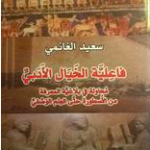In the past year I have read several books related to my writing project, most of them connected with old documents and newspapers, as well as some classical works, many short stories and foreign novels translated into Arabic.
On the Iraqi front, perhaps the most important books I have read during the year are:
1. Loliana, a novel by Nizar Abdel Sattar. Abdel Sattar is a distinguished writer who is outside the media spotlight. This novel is beautiful and distinctive. In it, the writer goes over two decades in the lives of Christian families in the city of Mosul, before the Islamic State period and the displacement that ensued. So it is not strange that he dedicates the novel to “those who carried the cross and left Mosul on July 19, 2014.” There’s skill in the narration and a touch of magical realism in the overview of the folk worlds of the Christian families. An engaging and enjoyable novel.
 2. The Efficacy of Literary Imagination (Fa’iliyyat al-Khayal al-Adabi) by Said al-Ghanmi. Ghanmi has one of the most brilliant minds in Iraq and has written several books on translation from English, literary criticism, and cultural theory. This fine book offers a literary analysis of myth and religion in the Middle East. It is innovative and original reading, written in an enjoyable narrative style.
2. The Efficacy of Literary Imagination (Fa’iliyyat al-Khayal al-Adabi) by Said al-Ghanmi. Ghanmi has one of the most brilliant minds in Iraq and has written several books on translation from English, literary criticism, and cultural theory. This fine book offers a literary analysis of myth and religion in the Middle East. It is innovative and original reading, written in an enjoyable narrative style.
3. Under the Devil’s Sky (Tahta Sama’ al-Shaytan), the memoirs of Qays Hassan. In this book Qays Hassan describes episodes from the life of a young Iraqi born in the 1960s, in the form of letters addressed to his hypothetical young son in an attempt to explain the troubles Iraq has been through. It’s an interesting narrative overview of the most important junctures in Iraqi life over three decades.
4. To Those Who Dare to Be Rational (Liman Yajru’ ala al-Aqlaniyya) by Maytham al-Hilo. In this interesting and enjoyable book, the doctor/author lays out his critique of religion and the Islamic tradition and proposes a modern concept of religion. Dr. Hilo set up a Facebook group by the same title many years ago and its page has attracted a large readership and much interest among intellectuals and young liberals and secularists. In this book he has brought together the articles he has published on Facebook, and it is a valuable addition to the movement that is critical of manifestations of Islamic religious fanaticism in Iraq and the Arab world in general. A book that deserves to be read and admired.
5. The Garden of Widows (Hadiqat al-Aramil), short stories by Diaa Jubaili. Jubaili, the author of this collection of 16 short stories, is one of the most active young writers in Iraq and has already published several novels and story collections. These enjoyable and original stories are set in parts of the ancient southern Iraqi city of Basra and are a mixture of folk stories and fantasy. Jubaili likes to blend in elements from well-known works of literature, such as George Orwell’s books and Franz Kafka’s The Metamorphosis, creating beautiful and revealing paradoxes. Interesting and enjoyable.
This piece was translated by Jonathan Wright. Wright studied Arabic at Oxford University and has spent much of the past three decades in the Arab world, mostly as a journalist with Reuters. He is the translator of Hassan Blasim’s The Corpse Exhibition, which won the Independent Foreign Fiction Prize and was one of Publishers Weekly’s Ten Best Books of 2014.
More from A Year in Reading 2017
Don’t miss: A Year in Reading 2016, 2015, 2014, 2013, 2012, 2011, 2010, 2009, 2008, 2007, 2006, 2005









